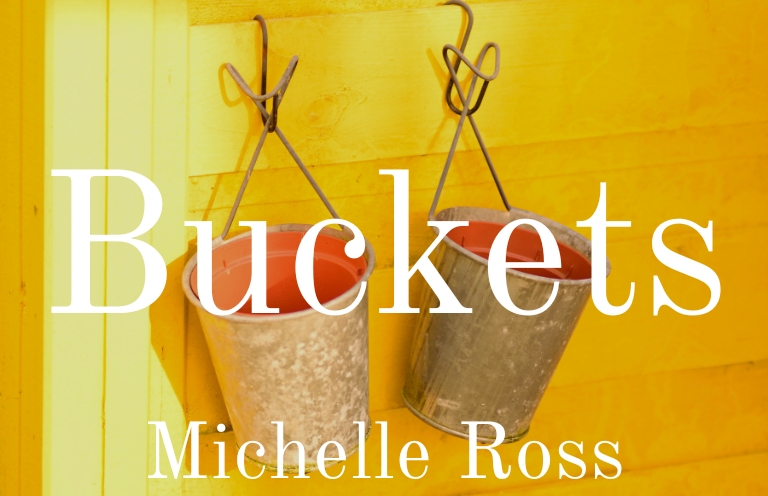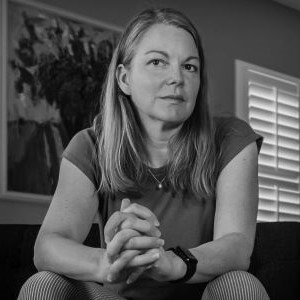With spare prose, Michelle Ross’s flash fiction, “Buckets” creates a picture of a marriage in a single moment. In a scene that is both moving and uncomfortable, the narrator and her husband confront his desire to stay in an ice hotel as well as his use of the term “bucket list.” Such a small moment, done so brilliantly, and with a perfect turn at the end.

Joel says he’s added sleeping in an ice hotel to his bucket list. He says this as he plunges boiled squash into their ice bath. We’re preserving vegetables every which way—freezing whole (jalapeños), freezing sliced (bell peppers), blanching and freezing (squash), and roasting and freezing (eggplant, Anaheim peppers). He didn’t want to help. He groaned, said we have a compost bin, said preservation seemed like more work than it was worth, said he doesn’t even like squash. I said, “You want to throw away good food?” He capitulated. Now here we are.
I look up from the Anaheim peppers I’ve been gutting and slicing. Their steamy clumps of seeds pull easily from their flesh, like egg sacks. This is the first I’ve heard of Joel keeping a so-called bucket list.
“I hate that term,” I tell him. I know that the bucket in question comes from kick the bucket, but what I hear—how can one not?—is an intent to fill a bucket. I picture a child on a beach plunking seashells into a plastic pail—no attention paid to whether they’re inhabited or not. I picture paper buckets (fried chicken), metal buckets (discarded crab legs and shrimp tails from messy lunches), plastic buckets (Easter eggs). I think of a stupid game I used to play in which I compelled myself to circle my favorite toy on each page of a catalog even if I didn’t care for anything on that page. Visit the pyramids in Giza. Plunk. Parachute. Plunk. Sleep in an ice hotel. Plunk.
I am a dedicated list maker, but I’m wary of this sort of list, of how quickly it can become a trap.
Joel sighs. “Call it what you want.” He adds more ice to the squash. “The point is that it’s something I’d like to do one of these days. It would be interesting.”
“Interesting how?”
“Have you seen pictures?” he says. “They’re otherworldly.” He picks up his phone, punches buttons, then holds it up for me to see. Crystalline walls, crystalline bed frame. A dim blue and purple glow, which makes me think of that Disney movie. Also, Superman’s Fortress of Solitude.
“But what does a bucket list mean to you? Like on your death bed, you’re going to be sad if you never stayed at an ice hotel?”
I love Joel. I chose him knowing he would never be wealthy, never buy me a million-dollar house or take me to fancy places. I’m good with all that. What I can’t abide is the stretchiness of his desire, the way it reaches beyond his means.
“You make a big deal out of everything,” Joel says. “Why can’t I just say I have a bucket list, and you just listen and nod your head? It’s a thing people do. It’s not a big deal. It doesn’t need to be psychoanalyzed.”
It’s a fair question, one I ask myself as well. Why do I need to pick apart his words? When I’m doing it or when I feel myself on the verge of doing it, I picture Jeff Goldblum sprouting spiky, fishhook hairs in The Fly.
At the same time, I am very serious here. The concept of a bucket list offends my sensibilities. Americans and their endless, planet-plunking desires. And that word: bucket. Even removed from the context of this dumb list, bucket is unappealing. If that word were a sentient creature, it would have a thick exoskeleton and heavy, clanking claws. Pail is much more refined.
“It’s consumeristic,” I say.
“No, it isn’t,” Joel says. “The point is the experience.”
“Experiences can be consumeristic, too. Staying in an ice hotel isn’t free.”
“So what if it isn’t free?” he says. “Why is that deserving of your scorn?”
I grasp for the words to answer this question. Something about security. Something about reining in our desires so they’re manageable. I picture a bonsai tree. I think of how I have to thin the carrots a few weeks after planting. It’s a surprisingly difficult thing to do—yanking out all those seedlings. Not physically. What I mean is sacrificing, choosing to have less. I know rationally that having more carrots actually means having fewer carrots, that they will be wispy if not given room to grow. But something in me resists the plucking and tossing. Something in me, in all of us, I suppose, is primed to always want more.
 Michelle Ross is the author of the story collections There’s So Much They Haven’t Told You, winner of the 2016 Moon City Short Fiction Award; Shapeshifting, winner of the 2020 Stillhouse Press Short Fiction Award; and They Kept Running, winner of the 2021 Katherine Anne Porter Prize in Short Fiction. Don’t Take This the Wrong Way, a story collection she cowrote with Kim Magowan, is just out from EastOver Press. Her work is included in Best Small Fictions, Best Microfiction, the Wigleaf Top 50, and the Norton anthology, Flash Fiction America. It’s received special mention in the Pushcart Prize anthology. She is an Editor at 100 Word Story. www.michellenross.com
Michelle Ross is the author of the story collections There’s So Much They Haven’t Told You, winner of the 2016 Moon City Short Fiction Award; Shapeshifting, winner of the 2020 Stillhouse Press Short Fiction Award; and They Kept Running, winner of the 2021 Katherine Anne Porter Prize in Short Fiction. Don’t Take This the Wrong Way, a story collection she cowrote with Kim Magowan, is just out from EastOver Press. Her work is included in Best Small Fictions, Best Microfiction, the Wigleaf Top 50, and the Norton anthology, Flash Fiction America. It’s received special mention in the Pushcart Prize anthology. She is an Editor at 100 Word Story. www.michellenross.com
